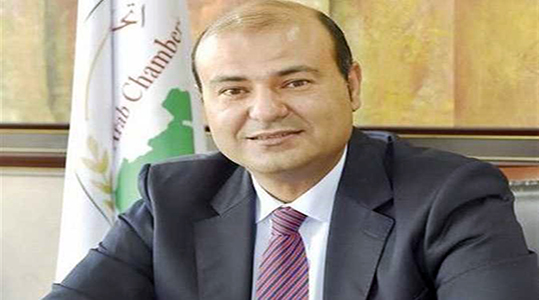The Secretary-General of the Union of Arab Chambers, Dr. Khaled Hanafy affirmed that “the main key to sustainable food security is the partnership between the public and private sectors,” noting that “many Arab chambers have modified their activities to respond to the challenges of the pandemic, and are supporting the initiatives of their countries and digitizing their services, organizing workshops remotely, and providing new services, especially for small and medium enterprises."
Hanafy's words came during his participation in the Arab Agriculture Day held this year under the title: “Rural prosperity is a necessity to achieve food security in the Arab region in light of the Corona pandemic,” organized by the Arab Organization for Agricultural Development.
Hanafy explained that the Union of Arab Chambers had from the beginning the issue of the repercussions of the "Covid-19" virus of special importance, whether by communicating with the main global importing countries of food commodities, or by actively participating in the Arab food safety team, or issuing proactive, forward-looking, and advisory studies and research." "The world, and with it the Arab world, survived a severe food crisis that was possible due to the repercussions of the Covid-19 virus, although prices have witnessed a local increase due to the hysterical demand for food purchases in the first period of the pandemic, but there is a living crisis that calls for great concern."
He also pointed out that "the Arab countries have strengthened their strategic stocks, which range from 3 to 12 months," explaining that "all Arab countries are net importers of food and any rise in prices could cause a social earthquake, as happened at the beginning of the current decade," stressing that "The Arab region spends about $110 billion on food imports, equivalent to approximately 4% of GDP, as well as a large technical gap and the predominance of traditional systems in agriculture and manufacturing, as well as weak investment in agriculture, where the share of agricultural projects is less than 5% of the total Sectoral investments."
Hanafy added that, "the gap of basic food commodities is estimated at about $32 billion, most of which is concentrated in cereal crops (especially wheat), which constitute about 50% of the gap, followed by vegetable oil and sugar crops. On a different side, the waste in food is very high, reaching about the third of the available commodities and food products, which means a loss of about 60 billion dollars annually. We also have a fundamental problem in wasting water despite its scarcity, as most of the waste goes to agriculture, which consumes more than 85% of the available freshwater."
UAC’s SG considered that "the current trends of agricultural and rural systems cannot continue, and this will exacerbate problems and challenges related to food security and the degradation of already scarce natural resources. To that end, we have to join the fourth agricultural revolution, and the development and adoption of digital innovation technologies, and the promotion of investment in them."
He also believes that “digital agriculture is not only limited to improving agricultural practices and rural livelihood, but is also linked to the value chains of the entire agri-food system, from the supply of inputs, to crop production, distribution, processing and sales, all the way to improving the end-consumer service. It also includes digital solutions based on communication networks and mobile applications, remote sensing, big data, and cloud analysis, artificial intelligence applications, the Internet of things, robots, drones, smart automation, and many more.
Hanafy stressed "The importance of digitizing knowledge in the field of agricultural extension, given that it is the first decisive step to launch the wheel of transformation and development in the countryside," affirming that "The importance of maintaining free trade and avoiding protection measures, as there is no country in the world that can produce all the food it needs," therefore, interdependence and diversity remains the most reliable and most effective guarantee of food security."
Source (Union of Arab Chambers)

